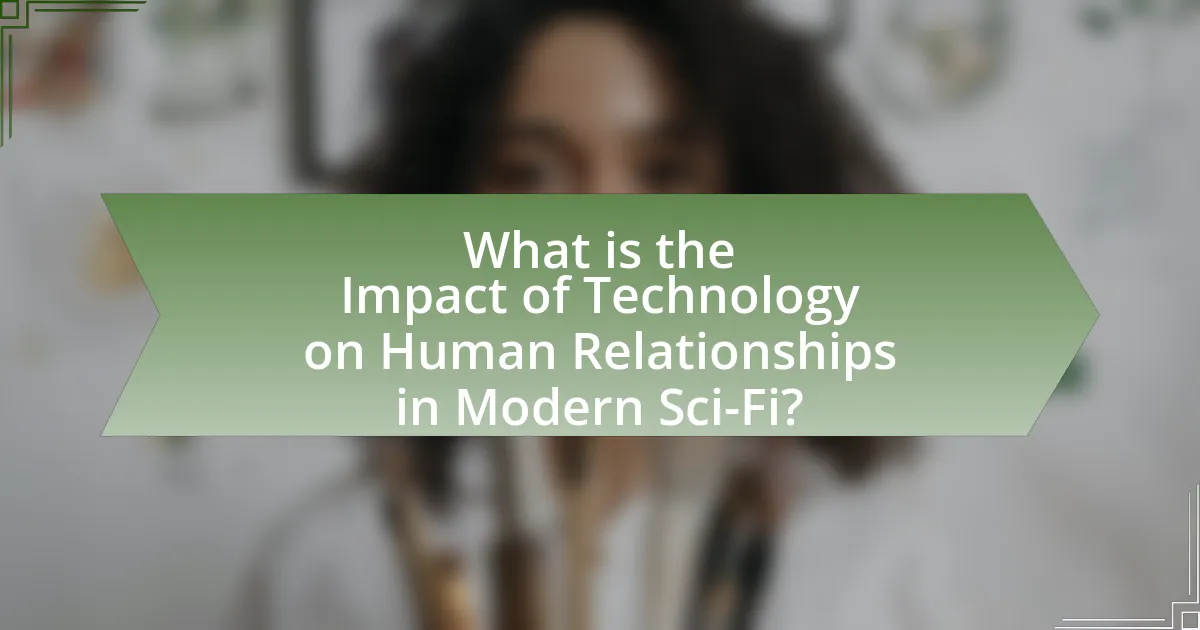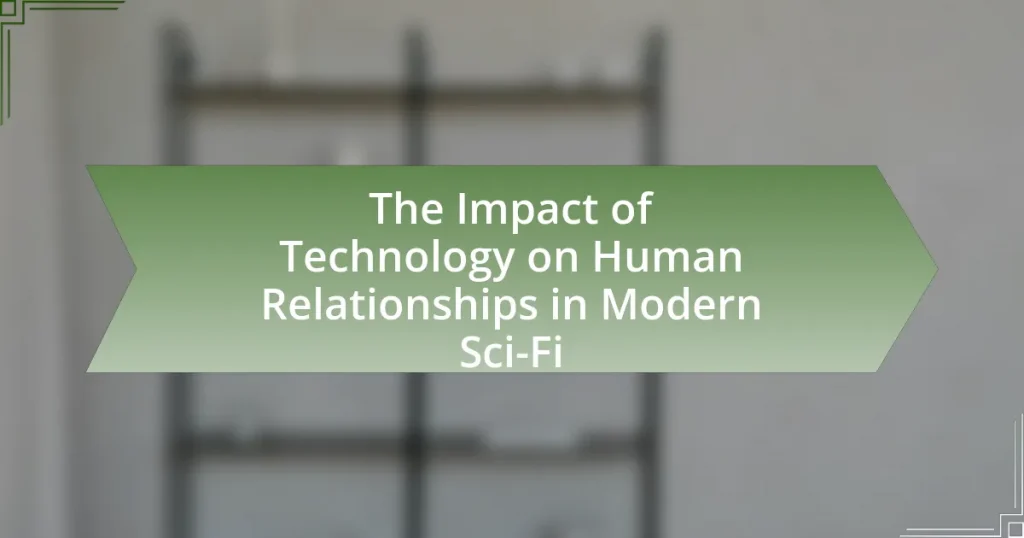The article examines the impact of technology on human relationships as portrayed in modern science fiction. It highlights how narratives depict technology as both a facilitator of connection and a source of alienation, with examples from works like “Ready Player One” and “Her.” Key themes explored include the influence of artificial intelligence, virtual reality, and biotechnology on interpersonal dynamics, as well as the ethical dilemmas these advancements present. The article also discusses the implications of virtual versus physical relationships, the evolution of character development in response to technology, and best practices for engaging with technology in personal relationships. Overall, it reflects contemporary societal issues and offers insights into the complexities of human interaction in a technology-driven world.

What is the Impact of Technology on Human Relationships in Modern Sci-Fi?
The impact of technology on human relationships in modern sci-fi is profound, often depicting both enhancement and alienation. In many narratives, technology facilitates connections through virtual communication, enabling relationships to thrive across distances, as seen in works like “Ready Player One,” where characters form bonds in a digital universe. Conversely, technology can also lead to emotional detachment and isolation, exemplified in “Her,” where a man develops a romantic relationship with an AI, highlighting the potential for technology to replace human interaction. These contrasting portrayals illustrate the dual nature of technology’s influence, shaping how individuals relate to one another in both positive and negative ways.
How does technology shape interpersonal dynamics in modern sci-fi narratives?
Technology significantly shapes interpersonal dynamics in modern sci-fi narratives by altering communication methods, influencing social structures, and redefining relationships. For instance, advanced communication technologies, such as virtual reality and artificial intelligence, create new forms of interaction that can enhance or hinder human connections. In narratives like “Black Mirror,” technology often leads to isolation or distorted relationships, illustrating the duality of technological impact. Furthermore, the portrayal of human-technology relationships, as seen in “Her,” emphasizes emotional connections with AI, challenging traditional notions of intimacy and companionship. These examples demonstrate that technology is a critical factor in shaping how characters relate to one another and navigate their social environments in contemporary sci-fi.
What are the common technological themes explored in these narratives?
Common technological themes explored in narratives about the impact of technology on human relationships in modern sci-fi include artificial intelligence, virtual reality, and biotechnology. These themes often examine how advancements in AI, such as autonomous decision-making and emotional intelligence, affect interpersonal dynamics and societal structures. Virtual reality is frequently depicted as a means of escape or a new form of social interaction, raising questions about authenticity and connection. Biotechnology, including genetic engineering and human enhancement, challenges traditional notions of identity and humanity, prompting ethical dilemmas regarding relationships and societal norms. These themes reflect contemporary anxieties and aspirations regarding technology’s role in shaping human experiences and connections.
How do these themes reflect contemporary societal issues?
The themes in “The Impact of Technology on Human Relationships in Modern Sci-Fi” reflect contemporary societal issues by illustrating the complexities of human interaction in an increasingly digital world. For instance, the portrayal of isolation and disconnection in sci-fi narratives mirrors real-life concerns about social media’s impact on face-to-face relationships, as studies show that excessive social media use can lead to feelings of loneliness and depression. Additionally, the exploration of artificial intelligence and its role in human relationships raises ethical questions about dependency on technology, paralleling current debates on privacy and surveillance in society. These themes serve as a lens through which to examine the evolving dynamics of human connection amidst technological advancements.
Why is the portrayal of technology in sci-fi significant for understanding human relationships?
The portrayal of technology in sci-fi is significant for understanding human relationships because it reflects and critiques contemporary societal dynamics and interpersonal connections. Sci-fi narratives often explore how technological advancements influence communication, intimacy, and social structures, revealing both potential benefits and drawbacks. For instance, in works like “Black Mirror,” technology serves as a lens to examine issues such as isolation and dependency, highlighting how digital interactions can replace or distort genuine human connections. This thematic exploration is crucial for understanding the evolving nature of relationships in a technology-driven world, as it prompts audiences to consider the implications of their own technological engagements.
What role does technology play in character development?
Technology significantly influences character development by shaping personalities, motivations, and interactions within narratives. In modern sci-fi, characters often evolve in response to technological advancements, reflecting societal changes and ethical dilemmas. For instance, in works like “Neuromancer” by William Gibson, characters are deeply affected by cybernetic enhancements, which alter their identities and relationships. This illustrates how technology can serve as a catalyst for character growth, pushing individuals to confront their humanity amidst rapid technological change.
How do relationships evolve in response to technological advancements in these stories?
In modern sci-fi stories, relationships evolve significantly in response to technological advancements by altering communication methods, emotional connections, and social dynamics. For instance, the introduction of virtual reality and artificial intelligence often leads to new forms of intimacy and companionship, as seen in works like “Her” by Spike Jonze, where a man develops a romantic relationship with an AI operating system. This evolution reflects a shift from traditional face-to-face interactions to digital connections, which can enhance or complicate emotional bonds. Furthermore, technology can create barriers, as depicted in “Black Mirror,” where social media influences personal relationships, often leading to superficial connections and increased isolation. These narratives illustrate how technology reshapes the fabric of human relationships, highlighting both the potential for deeper connections and the risks of disconnection.
What are the potential consequences of technology on human connections in modern sci-fi?
The potential consequences of technology on human connections in modern sci-fi include increased isolation, superficial relationships, and altered communication dynamics. In many narratives, advanced technologies such as virtual reality and artificial intelligence create environments where individuals prefer digital interactions over face-to-face connections, leading to a decline in meaningful relationships. For instance, in the film “Her,” the protagonist develops a deep emotional bond with an AI, highlighting how technology can replace human companionship. Additionally, studies indicate that excessive reliance on social media can result in feelings of loneliness and depression, as real-life interactions diminish. These examples illustrate that while technology can enhance connectivity, it often undermines the depth and quality of human relationships.
How does technology influence emotional intimacy among characters?
Technology significantly influences emotional intimacy among characters by facilitating communication and connection, often transcending physical barriers. For instance, in modern sci-fi narratives, characters frequently utilize advanced communication tools, such as virtual reality or instant messaging, to share their thoughts and feelings in real-time, fostering deeper emotional bonds. Research indicates that digital interactions can enhance feelings of closeness, as seen in studies where individuals report increased intimacy through text-based communication compared to face-to-face interactions. This phenomenon is evident in works like “Her” by Spike Jonze, where a character develops a profound emotional relationship with an AI, illustrating how technology can create intimate connections that challenge traditional notions of relationships.
What are the implications of virtual relationships versus physical ones?
Virtual relationships often lack the depth and emotional connection found in physical ones, leading to implications such as reduced intimacy and increased feelings of loneliness. Studies indicate that while virtual interactions can provide social support, they may not fulfill the same emotional needs as face-to-face relationships. For instance, research published in the journal “Computers in Human Behavior” shows that individuals who primarily engage in online relationships report higher levels of loneliness compared to those with strong physical social networks. Additionally, the absence of non-verbal cues in virtual communication can hinder effective emotional expression, further impacting relationship quality.
How do modern sci-fi works address the balance between technology and human connection?
Modern sci-fi works often explore the balance between technology and human connection by depicting scenarios where advanced technology enhances or undermines interpersonal relationships. For instance, in series like “Black Mirror,” episodes such as “Nosedive” illustrate how social media and technology can create superficial connections, leading to isolation and anxiety. Conversely, works like “Her” showcase technology as a means to foster deep emotional bonds, as the protagonist develops a meaningful relationship with an AI. These narratives reflect contemporary societal concerns about technology’s role in shaping human interactions, emphasizing both its potential to connect and its capacity to alienate individuals.
What specific examples illustrate the impact of technology on relationships in modern sci-fi?
Specific examples illustrating the impact of technology on relationships in modern sci-fi include the use of virtual reality in “Ready Player One,” where characters form connections in a digital universe, often prioritizing virtual interactions over real-life relationships. Another example is the film “Her,” which depicts a man developing a romantic relationship with an artificial intelligence, highlighting the emotional complexities and ethical dilemmas of human-AI relationships. Additionally, the series “Black Mirror” explores various scenarios, such as in the episode “San Junipero,” where technology allows individuals to live in a simulated reality, affecting their connections and experiences of love and loss. These examples demonstrate how technology reshapes interpersonal dynamics, often blurring the lines between reality and virtuality.
How do these examples reflect real-world technological trends?
These examples reflect real-world technological trends by illustrating the increasing integration of technology into daily human interactions. For instance, the portrayal of virtual reality and artificial intelligence in modern sci-fi mirrors the current advancements in these fields, such as the rise of social media platforms and AI-driven communication tools. Research indicates that over 4.5 billion people use social media globally, highlighting a shift in how relationships are formed and maintained through digital means. Additionally, the depiction of emotional connections with AI in sci-fi parallels the development of empathetic AI systems, which are being designed to enhance user experience and emotional engagement. This alignment between fictional narratives and technological advancements underscores the profound impact of technology on human relationships today.
What lessons can be learned from these narratives about our own relationships?
Narratives about the impact of technology on human relationships in modern sci-fi teach us that reliance on technology can lead to emotional disconnection. For instance, characters often experience isolation despite being constantly connected through devices, highlighting the paradox of digital communication. Research indicates that excessive screen time correlates with decreased face-to-face interactions, which can diminish relationship quality. A study by Primack et al. (2017) found that higher social media use is associated with perceived social isolation, reinforcing the lesson that technology can hinder genuine human connection.
What are the best practices for engaging with technology in our relationships, inspired by modern sci-fi?
The best practices for engaging with technology in our relationships, inspired by modern sci-fi, include prioritizing face-to-face communication, setting boundaries for technology use, and utilizing technology to enhance emotional connection. Prioritizing face-to-face communication helps maintain intimacy, as seen in narratives where characters struggle with isolation due to over-reliance on virtual interactions. Setting boundaries, such as designated tech-free times, fosters deeper connections, reflecting themes in sci-fi where characters reclaim their humanity by disconnecting from devices. Lastly, using technology to share experiences, like virtual reality date nights, can enhance emotional bonds, mirroring sci-fi explorations of technology as a tool for connection rather than a barrier. These practices are supported by studies indicating that balanced technology use can improve relationship satisfaction and emotional intimacy.




